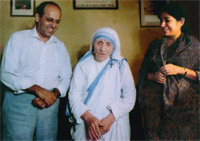Civil Servant, Former Chief Election Commissioner and Author of an International Bestseller.

Other Articles
Articles on Mother Teresa
Remembering Mother Teresa
 "What we are doing is nothing but a drop in the ocean. But if we didn't do it, the ocean would be less because of that missing drop. I do not agree with the big way of doing things. To me what matters is an individual. To get to love the person, we mu st come in close contact with him or her. If we wait till we get the numbers, then we will be lost in numbers. And we will never be able to show the love and respect for that person. Every person is Christ for me, and since there is only one Jesus, that person is the one person in the world at that moment."
"What we are doing is nothing but a drop in the ocean. But if we didn't do it, the ocean would be less because of that missing drop. I do not agree with the big way of doing things. To me what matters is an individual. To get to love the person, we mu st come in close contact with him or her. If we wait till we get the numbers, then we will be lost in numbers. And we will never be able to show the love and respect for that person. Every person is Christ for me, and since there is only one Jesus, that person is the one person in the world at that moment."
"I have never been in need but I accept whatever people give me for the poor. I never refuse them because they have a right to give in charity. I accept whatever. I only feel angry when I see people throwing away things that we could use."
- Mother Teresa in conversation with Navin Chawla, Calcutta,
March 24, 1996.
Scene One: Ten years ago, I headed the Health Department of Delhi State. Amongst the 14 hospitals in my charge was a hospital for mental diseases. I had inspected this hospital on many occasions. The first of these inspections opened me to the wor ld of the mentally disabled so vividly that I will always carry the memory of the acute patients, who could well have been described as the inmates of a jail, padlocked as they were in the most pitiable conditions. I soon discovered that in spite of my o wn will power and the abundant financial resources of the administration, I was not able to make the slightest dent in the welfare of these patients. Most of the doctors and nurses were reluctant to serve in the hospital, not only because working with th e severely mentally disabled is extremely difficult at the best of times, but also because the hospital was considered very low in the pecking order in terms of apparent prestige.
Even on my last visit at the end of that tenure, things had only marginally improved. My abiding memory is of two dozen completely naked men, crouched in terror in one corner of the hall, their clothes and blankets which they themselves had torn into shr eds, their bodies unwashed, as if they had not been bathed for weeks. More than anything else I remember the despair in their eyes.


